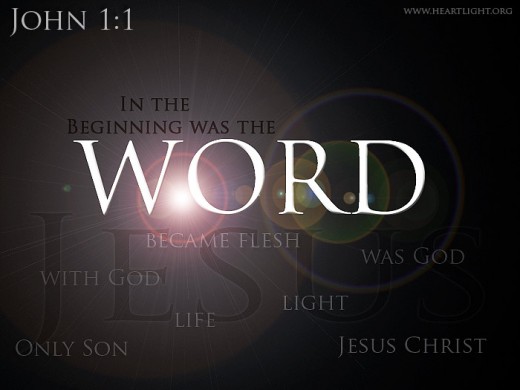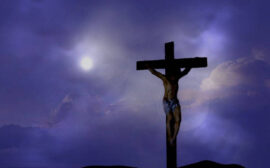By: Brian G. Chilton | September 10, 2018
The Gospel of John has been one of my favorite Gospels since I first started studying the Bible. The Gospel of John is theologically rich as well as historically accurate. One of the important sections of John’s Gospel is found in its opening chapter. John says,
“In the beginning was the Word, and the Word was with God, and the Word was God. He was with God in the beginning. All things were created through him, and apart from him not one thing was created that has been created. In him was life, and that life was the light of men. That light shines in the darkness, and yet the darkness did not overcome it . . . He was in the world, and the world was created though him, and yet the world did not recognize him. He came to his own, and his own people did not receive him. But to all who did receive him, he gave them the right to be the children of God, to those who believe in his name, who were born, not of natural descent, or of the will of the flesh, or of the will of man, but of God. The Word became flesh and dwelt among us” (John 1:1-5, 10-14a).[1]
The best evidence suggests that John the apostle wrote these words. John bar Zebedee is confirmed as the author both by internal and external evidence (especially by Irenaeus, Tertullian, Origen, Polycarp, Clement of Alexandria, and later Eusebius).
John also confirms an additional segment of information in his first letter. He writes, “This one is the antichrist: the one who denies the Father and the Son. No one who denies the Son has the Father; he who confesses the Son has the Father as well” (1 John 2:22-23). That is to say, the truth is that Jesus is the Word as described in John chapter 1. If one denies this truth, then one denies a core fundamental of the faith.
Such information is important to know because John chapter 1 combats three modern forms of theology that must be eschewed by the believer who seeks to accept the truth of God’s word. These three false modern doctrines will be described in this article. Note, however, that I realize that there are many good people in the groups I will discuss. Their problem is theological and not necessarily moral. Good people can hold bad theological views.
John 1 Combats Jehovah Witness/Arian Theology. The Jehovah Witness movement was started by one Charles Taze Russell. Their theology is not that original in scope as they borrow from an ancient heresy known as Arianism. Arius of Alexandria (256-336 AD) was a presbyter who formulated the idea that Jesus was not really God, but rather an archangel. Jesus was the first created being according to Arian theology. Arianism was successfully combated by Athanasius of Alexandria (296-373 AD) who stood for the orthodox Christian view that Jesus was God come in the flesh. Athanasius’s victory was not without cost. He was exiled at least three times until it was finally resolved that Athanasius’s view corresponded with biblical truth.
Unfortunately, in today’s fragmented ecclesiastical structure, there is not as much church authority to combat false doctrines such as Arianism. For that reason, Charles Taze Russell’s theology was able to succeed. He developed a very similar doctrine as Arius’s and formulated the Jehovah Witness movement. Yet, John 1 stands opposed to any claim that Jesus was merely an angel. Jesus was God (Jn. 1:1) and not a mere angelic entity. Thus, the Jehovah Witness doctrine finds itself falling short from biblical orthodoxy just as Arius’s view did.
John 1 Combats Mormon Theology. Joseph Smith was born in Sharon, Vermont on December 23, 1805. Smith claimed to have seen an angel by the name of Moroni who supposedly gave Smith a newer testament called the Book of Mormon which describes how the risen Jesus purportedly visited a group of Native Americans known as the Nephites. According to Mormon theology, Jesus was the first spirit-child originating from the Heavenly Father and the Heavenly Mother. However, John 1 greatly combats that idea. Jesus is presented as being co-eternal with the Father. Thus, Jesus was not the first spirit-child. Rather, Jesus was God who existed since from before the beginning of all creation and who came in flesh “and dwelt among us” (Jn. 1:14a).
John 1 Combats New Age Theology. New Age theology holds that each person is his/her own god. Ironically, it seems that false doctrines deescalate the person of Jesus and elevate the human being, whereas orthodoxy elevates the persona of Jesus and deescalates humanity. Nevertheless, John 1 teaches that “all things were created through [Jesus], and apart from him not one thing was created that has been created” (Jn. 1:3). Thus, if “all things” (Gk. panta) really means “all things,” then human beings cannot claim to be any form of god much less their own.
Each Christian must test truth each doctrine they come across philosophically and theologically by God’s word. While we need to remember that we must love each person with whom we come into contact, we cannot accept false doctrines. Stay true to God’s word and the theological power found within its pages. Leave everything else by the wayside.
[1] Unless otherwise noted, all quoted Scripture comes from the Christian Standard Bible (Nashville: Holman, 2017).
Brian G. Chilton is the founder of BellatorChristi.com and is the host of The Bellator Christi Podcast. He received his Master of Divinity in Theology from Liberty University (with high distinction); his Bachelor of Science in Religious Studies and Philosophy from Gardner-Webb University (with honors); and received certification in Christian Apologetics from Biola University. Brian is currently enrolled in the Ph.D. program in Theology and Apologetics at Liberty University. Brian has been in the ministry for over 15 years and serves as a pastor in northwestern North Carolina.
© 2018. BellatorChristi.com.






[…] Source: Theologies that John Chapter One Combats […]